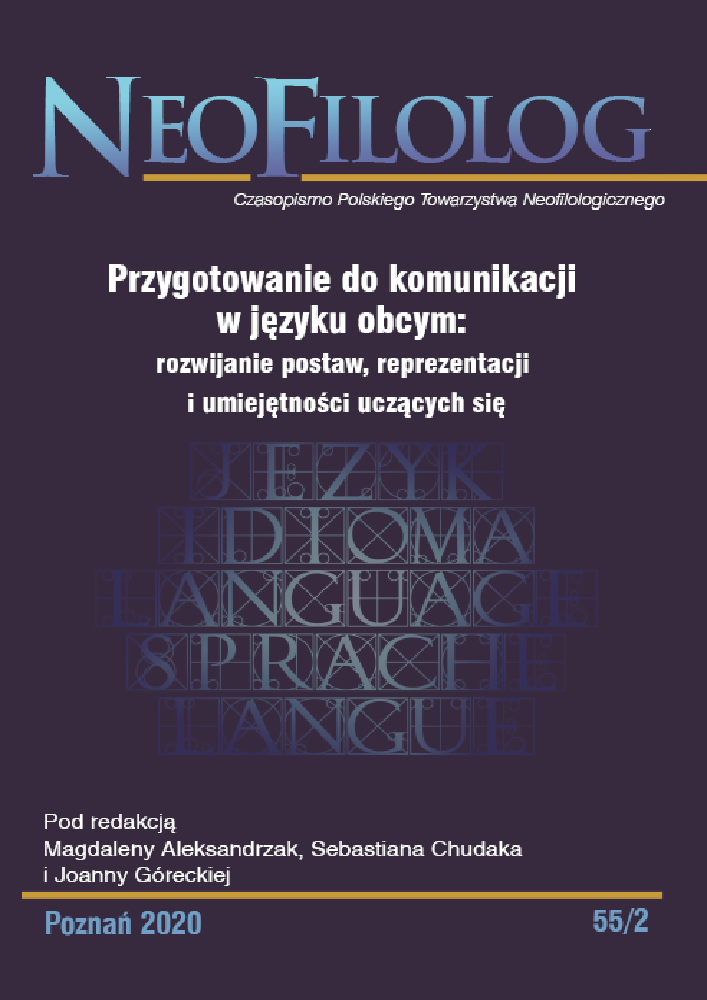Résumé
The main of this article is to present the results of a pilot study carried out among 476 students of selected foreign languages at Warsaw University. The research covered the following issues: (1) students’ interest in various courses included in philology studies (literature, linguistics, foreign language didactics, etc.); (2) the dominant motivation for undertaking philological studies and (3) students’ initial career plans. The research is diagnostic and descriptive and it will be continued at over a dozen Polish universities. The main goal of this project is to build a social representation of foreign language studies in Poland today. The Polish Association of Modern Languages (PTN) is a patron of the study.
Références
Baran-Łucarz M. (2014), Podejście studentów filologii angielskiej do refleksji w nauce wymowy. „Neofilolog”, nr 42/1, s. 9–23
Biernacka-Licznar K. (2013), Narracyjne studium życia na przykładzie studentów Wydziału Filologicznego Uniwersytetu Wrocławskiego. „Italica Wratislaviensia”, nr 4, s. 9–27.
Dańko M., Wieszczeczyńska E. (2013), Wymogi współczesnego rynku pracy w odniesieniu do kompetencji absolwentów kierunków humanistycznych. „Neofilolog”, nr 40/1, s. 43–57.
Jaroszewska A. (2014), Sukces w nauce języka obcego w opinii studentów pierwszego roku warszawskiej germanistyki, (w:) Karpeta-Peć B., Kucharczyk R., Smuk M., Torenc M. (red.), Wyznaczniki sukcesu nauczyciela i ucznia w glottodydaktyce. Warszawa: Instytut Germanistyki i Instytut Romanistyki Uniwersytetu Warszawskiego, s. 283–294.
Lankiewicz H. (2013), Filologiczna praca licencjacka a rozwój kompetencji naukowych studenta. „Neofilolog”, nr 40/1, s. 111–125.
Nerlicki K. (2014), O sukcesach z perspektywy studentów germanistyki, którzy boją się mówić, (w:) Karpeta-Peć B., Kucharczyk R., Smuk M., Torenc M. (red.), Wyznaczniki sukcesu nauczyciela i ucznia w glottodydaktyce. Warszawa: Instytut Germanistyki i Instytut Romanistyki Uniwersytetu Warszawskiego, s. 295–306.
Paprocka-Piotrowska U., Knieja J. (2009), Motywacje studentów neofilologii: od kandydata do absolwenta. „Przegląd Glottodydaktyczny”, nr 26, s. 159–172.
Pawlak M., Mystkowska-Wiertelak A., Bielak J. (2014), Przekonania studentów filologii angielskiej na temat nauczania gramatyki. „Neofilolog”, nr 42/1, s. 77–93.
Pudo D. (2017), Subiektywne teorie na temat uczenia się języka obcego studentów romanistyki. „Neofilolog”, nr 48/1, s. 55–71.
Sowa M., Mocarz-Kleindienst M., Czyżewska U. (red.) (2015), Nauczanie języków obcych na potrzeby rynku pracy. Lublin: Wydawnictwo KUL.
Werbińska D. (2012), Akwizycja języka obcego w perspektywie studenta filologii: badanie tożsamości narracyjnej studenta w kontekście czasoprzestrzeni i heteroglosji. „Neofilolog”, nr 39/1, s. 55–80.
Wróblewska-Pawlak K., Okęcka H. (2000), Socjologiczny portret studentów romanistyki UW: motywacje, wyobrażenia, plany i potrzeby, (w:) Okęcka H., Wróblewska-Pawlak K., Zając J. (red.), Le français langue étrangère à l’université – nouveaux objectifs, nouveaux besoins. Instytut Romanistyki Uniwersytetu Warszawskiego: Warszawa, s. 57–85.
Licence
© Maciej Smuk 2020

Ce travail est disponible sous licence Creative Commons Attribution - Pas de Modification 4.0 International.
Auteurs :
Les auteurs de textes acceptés pour publication dans la revue Neofilolog sont tenus de remplir, signer et renvoyer à l'adresse de la rédaction, un accord sur l'octroi d'une licence gratuite pour les œuvres, avec obligation d'accorder une sous-licence CC.
En vertu de cet accord, les auteurs des textes publiés dans la revue Neofilolog accordent à l'Université Adam Mickiewicz de Poznań une licence non exclusive et gratuite et permettent l'utilisation de la sous-licence Creative Commons Attribution-NoDerivatives 4.0 International (CC BY-ND 4.0).
Les auteurs se réservent le droit de disposer librement de l'œuvre.
Utilisateurs :
Les utilisateurs d'Internet intéressés ont le droit d'utiliser les œuvres publiées à partir de l'année 2017 sous réserve des conditions suivantes :
- reconnaissance de la qualité d'auteur - l'obligation de fournir des informations sur la qualité d'auteur, le titre, la source (liens vers l'œuvre originale, DOI) et la licence, ainsi que l'œuvre distribuée ;
- sans créer d'œuvres dérivées - l'œuvre doit être conservée dans sa forme originale, p. ex. les traductions ou les interprétations ne peuvent être distribuées sans le consentement de l'auteur.
Tous les textes publiés sont soumis au droit d'auteur.
Autres :
L'Université Adam Mickiewicz de Poznań se réserve le droit à la revue dans son ensemble (mise en page, forme graphique, titre, conception de la couverture, logo, etc.).
.

